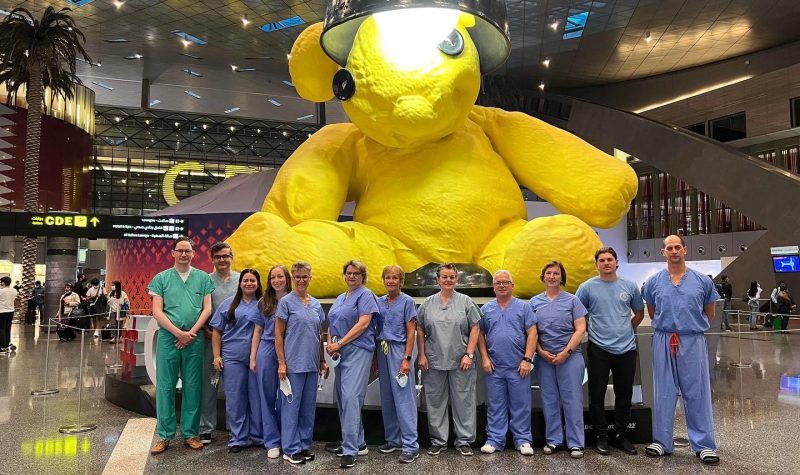A national team of 30 Dalhousie-led volunteers recently performed 13 life-saving cardiac surgeries at King Faisal Hospital in Kigali, Rwanda, with the support of official Airline partners Qatar Airways and RwandAir.
The team was led by cardiac surgeons Dr. David Horne and Dr. Keir Stewart from Dalhousie University’s Department of Surgery.
In 2019, Dr. Stewart, a cardiac surgeon and Dalhousie alumni created the Canadian Rwanda Open-heart Project (CROP) to perform cardiac surgeries in Rwanda, with a longer-term goal to participate in the development of an independent cardiac surgery program there.
The Canadian Rwandan Open-heart Project (CROP) teams traveled to Rwanda on May 19 to perform valve replacement surgeries in adults with Rheumatic heart disease (RHD), and surgeries in pediatric patients with congenital heart conditions or RHD.
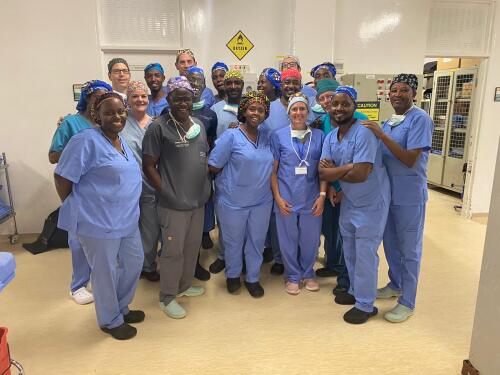
Two teams of 32 doctors, health care physicians, nurses, and volunteers spent around ten days performing surgeries for adults and children in King Faisal Hospital, Kigali. Photo contributed.
According to Horne, the surgeries which concluded in early June were a great success.
"Rheumatic heart disease is basically one of the two severe complications from strep throat. If you don't get strep throat treated, then the body starts attacking different organs in the body, and the heart is one of the most common ones."
While RHD is not a big medical concern in Canada, since in most cases, it is treated right away, RHD is a condition that affects 39 million people worldwide.
In severe cases of RHD, if the valves get affected, patients can develop heart failure that causes premature death if not treated with surgery.
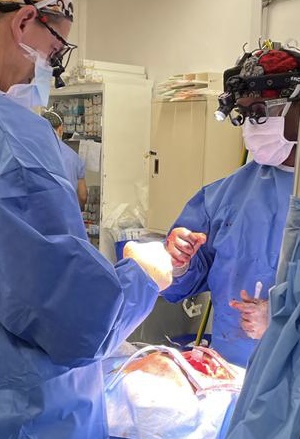
Dr. David Horne (left) is seen performing open heart surgery with Dr. Maurice Musoni in King Faisal Hospital, Rwanda. Photo contributed.
Two teams of 32 doctors, health care physicians, nurses, and volunteers spent around ten days performing surgeries for adults and children.
"We performed surgery on seven adults the first week, and then six children in the second week. We went before and screened many more in order to identify patients that need us, and also patients with the higher probability of surviving surgery."
Cardiac Surgeon Dr. Andy Fagan trained with Horne in critical care units in Ontario and Chicago. For this trip, he was responsible for the ICU department and operations.
Fagan was mentored by Horne at Dalhousie University three years ago and was one of the team members that traveled abroad to Rwanda for the first time, saying it was a challenging experience.
"I have worked in three different hospitals doing critical care as part of my training from Canada to the United States, and how we deliver care is very similar" Fagan said. "Going to Rwanda is kind of like a black box for me. You don't know what to expect and what challenges will come up."
After arriving, Fagan said everything went according to plan and that medicine is similar no matter which country.
The trip was originally planned for 2020, but the pandemic was a challenge for the team: Horne had canceled three organized trips.
"Basically, cardiac surgery just stopped in Rwanda for that period. Also, the other teams from around the world that have been going there for over the last 10-15 years, nobody was able to go."
Dalhousie University played a huge role by starting the CROP program, and providing the funds necessary for these trips.
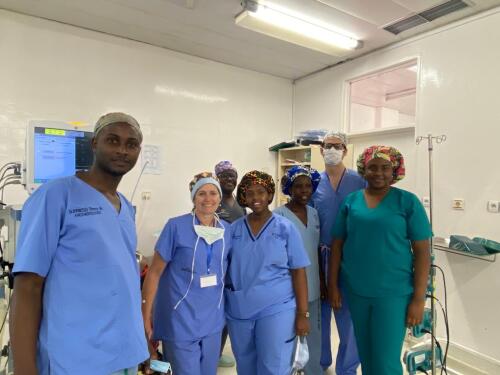
Dalhousie University played a huge role by starting the CROP program, and providing the funds necessary for mission trips. Photo contributed.
Horne has participated in mission trips around the globe before, and has been traveling to Kenya since 2016.
"We work in a privileged society and a privileged system, and all the big health organizations have made global health and global surgery, something that we need to strive to."
Currently, Horne and the Dalhousie medical team are developing a fellowship in general surgery to help promote the interest in global health.
While there are grants and awards available, performing surgeries abroad is not an easy task as student funding is about $4,000 per person.
Surgeries lasted from about four to twelve hours, Dr. Fagan said operating in Rwanda was different due to a lack of resources.
"In Chicago, our ICU department had 23 beds, whereas, we had five beds in Rwanda."
Other challenges included transportation as they were called in the middle of the night to check up on cases. Upon arriving at the hospital, Fagan recalled showing up in an empty room with no equipment for an ICU unit.
"I've never started at ICU from scratch, so we wrote a list and we gave it to their supply chain person, and then the next morning boxes and boxes started to show up with a flow of supplies and medications."
The team received sponsorship from Qatar Airways and RwandAir, as well as receiving supplies and valves through donations.
The Dalhousie medical team said they are excited to be working on another mission trip to King Faisal Hospital in Rwanda in December.
Both Horne and Fagan encourage interested medical students to reach out, to learn more about global healthcare, or programs and opportunities offered at Dalhousie University.
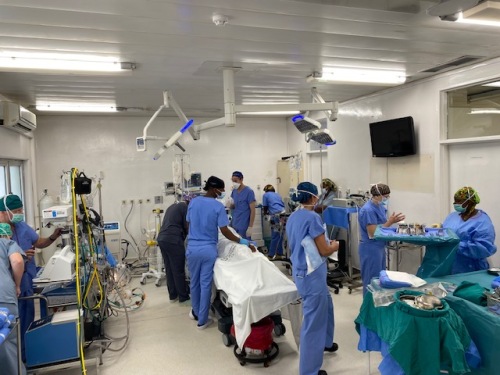
The Dalhousie medical team said they are excited to be working on another mission trip to King Faisal Hospital in Rwanda in December. Photo contributed.
Listen to the full interview below:


